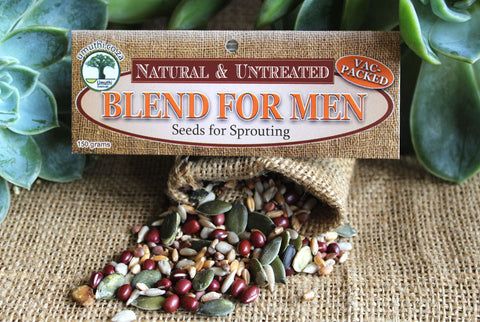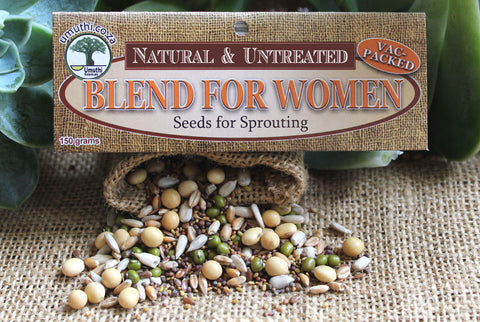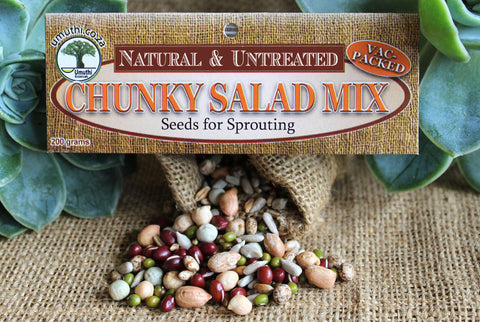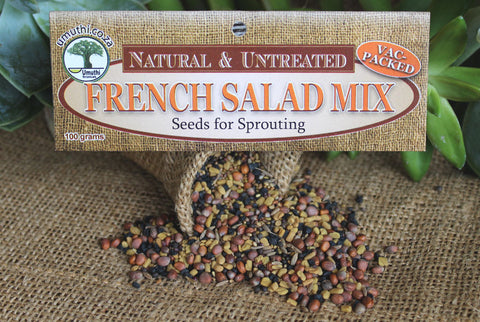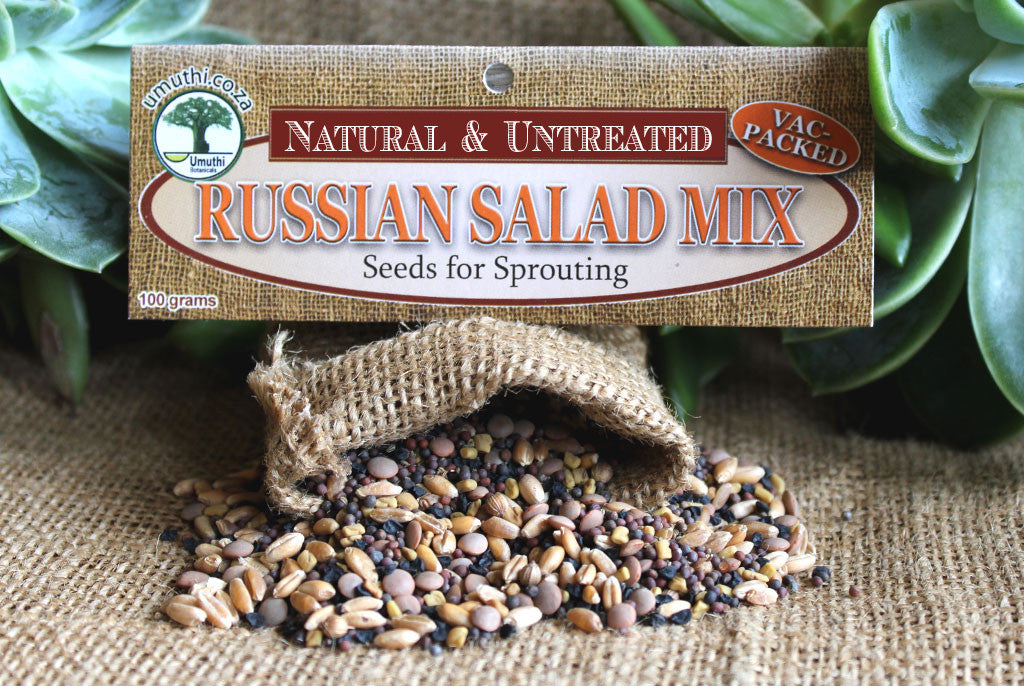
RUSSIAN SALAD MIX
Russian Salad Mix
Our Russian Salad Mix of Black Lentils, Broccoli, Celery, Coriander, Fenugreek, Mustard, Onion and Red Cabbage seeds, with Wheat Kernals have been chosen for their traditional Russian flavours, which are popular around the world.
May vary subject to availability.
Lentil Black
Botanical name: Lens (Culinaris)
Black Lentils are a light or dark brown disc shaped seed. Well known as nutrtious cooked food, there is more Iron and Copper in the sprouts. By sprouting legumes you neutralize phytic acid and lectins, which means more vitamins and minerals can be absorbed by your body as they are digested. Sprouting increases the amount of vitamins and minerals in the lentils, especially B vitamins and carotene. Sprouting also helps break down some of the sugars that can create intestinal gas. Lentils have the highest level of protein of any legume, after soya, and whilst not a complete protein, once sprouted they contain sufficient levels of amino acids.
Nutritional Value: Very low in Saturafated Fat, Cholesterol and Sodium. It is also a good source of Thiamin, Iron, Phosphorus and Manganese very good source of Dietary Fiber and Folate.
Broccoli
Botanical name: Brassica Oleracea
Broccoli is a small, dark, typical brassica seed. It has a fairly strong flavour, so good to mix with other sprouts. Broccoli Sprouts are a renowned Superfood chich is reported to boost the immune system. Famous for their antioxidant content, Broccoli sprouts contain approximately 50 x the sulfurophane found in mature broccoli by weight, therefore a handful of sprouts will give you more antioxidant value than one and a half kilos of fully grown broccoli. Broccoli also has the highest lutein, carotenoid and beta carotene content of all the sprouts.
Nutritional Value: Brocolli is very low in Saturated Fat and Cholesterol, is a godo source of Protein, Vitamin E (Alpha Tocopherol), Thiamin, Riboflavin, Pantothenic Acid, Calcium, Iron, Magnesium, Phosphorus and Selenium, and a very good source of Dietary Fiber, Vitamin A, Vitamin C, Vitamin K, Vitamin B6, Folate, Potassium and Manganese.
Coriander
Botanical name: Coriandrum Sativum
The flavour of coriander has a distinct, pungent, earthy taste similar to a blend of lemon and sage. The health benefits of coriander are reported to be of benefit in the treatment of skin inflammation, high cholesterol levels, diarrhea, mouth ulcers and blood sugar disorders.
Nutritional Value: Coriander (Cilantro) is very low in Saturated Fat and Cholesterol. It is also a good source of Tiamin anbd Zinc, and a very good source of Dietary Fiber, Vitamin A, Vitamin C, Vitamin E (Alpha Tocopherol), Vitamin K, Riboflavin, NIacin, Vitamin B6, Folate, Pantothenic Acid, Calcium, Iron, Magnesium, Phosphorus, Potassium, Copper and Manganese.
Celery
Botanical name: Apium graveolens
Celery is a tiny, light brown seed. It has a grassy, sweet, slighly bitter flavour, witha pleasant chlorophyll taste. One of the most common uses of celery seed for health benefits is as a diuretic, and it is also thought to be one of the most effective natural remedies for stomach bloating.
Nutritional Value: Celery is very low in Cholesterol. It is also a good source of Riboflavin, Vitamin B6, Pantothernic Acid, Calcium, Magnesium and Phosphorus, and a very good source of Dietary Fiber, Vitamin A, Vitamin C, Vitamin K, Folate, Potassium and Manganese.
Fenugreek
Botanical name: Trigonella Feonum-graecum
Fenugrek is an irregular shaped, golden coloured seed with a pungent smell. It is frequently used as a spice in Indian cuisine. When sprouted it has a milder flavour.
Nutrional Value: Very low in Saturated Fat and Cholesterol, a good source of Prtein, Vitamin E (Alpha Tocopherol:, Thiamin Riboflavin, Pantothenic Acid, Calcium, Iron, Magnesium, Phosphorus and Selenium, and a very good source of Dietary Fiber, Vitamin A, Vitamin C, Vitamin K, Vitamin B6, Folate, Potassium and Manganese it has been reported that Fenugreek has properties that may reduce cholesterol, stabilize blood sugar, and assist with bronchitis and sore throats. It is also rich in a compound called diosgenin reported to be the precursor for the semisynthesis of progesterone.
Mustard
Botanical name: Brassica juncea
Mustard is a small, rich brown seed whose sprouts have a very sharp taste, similar to Horseradish. A much loved taste used in recipes around the world.
Nutritional Value: Very low in Saturated Fat and Cholesterol, however very high in Sodium.
Red Cabbage
Botanical name: Brassica Oleracea var. Capitata f Rubra
A small, dark, typical Brassica seed. The sprouts have a mild cabbage flavour, and a lovely red colour. It is considered to be more nutritious than the more common green variety as it contains Polyphenols which are antioxidant and ant-inflammatory. Grows into a wonderful microgreen.
Nutritional Value: Very low in Saturated Fat and Cholesterol, it is a good source of Thiamin, Riboflavin, Folate, Calcium, Iron and Magnesium, and a very good source of Dietary Fibre, Vitamin A, Vitamin C, Vitamin K, Vitamin B6, Potassium and Manganese. However a large portion of the calories in this food come from sugars.
Onion
Botanical name: Allium family
Onion seed is small, flat, black and irregular shaped. We use brown onion seed which is the highest quality. Allium sprouts are unlike other seeds as they produce the root first.
Nutrional Value: Onion is very low in Saturated Fat, Cholesterol and Sodium. It is also a good source of Dietary Fiber, Vitamin B6, Folate, Potassium and Manganese, and a very good source of Vitamin C. It has a high sugar content.
Wheatgrass
Botanical name: Triticum aestivum
What kernels are typical brown grass seeds. When grown as a microgreen and juiced, it is claimed to be a sh ot glass of health, stimulating circulation, improving digestion, relieving arthritis and reducing fatigue to name but a few of it's benefits. Grown as a micro green to harvest for juicing for which a special juicer will be required.
Nutritional Value: A good source of Protein and Potassium, and a very good source of Dietary Fibre, Vitamin A, Vitamin C, Vitamin E (Alpha Tocpherol), Vitamin K, Thiamin, Riboflavin, Niacin, Vitamin B6, Pantothenic Acid, Iron, Zinc, Copper, Manganese and Selenium.

